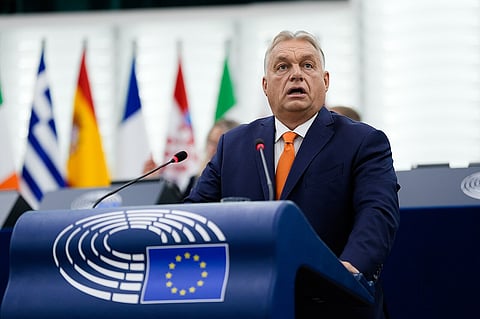

A group of 26 Members of the European Parliament (MEPs) has called on the European Commission to immediately suspend all EU funding to Hungary, citing a sharp deterioration in democratic standards and violations of the bloc’s core values by Prime Minister Viktor Orbán’s government.
In a letter published Tuesday and addressed to Budget Commissioner Piotr Serafin and Justice Commissioner Michael McGrath, the cross-party group of lawmakers accused the Hungarian government of backsliding on the rule of law and warned that EU financial interests were at risk. The signatories, hailing from five different political groups, include influential figures such as Monika Hohlmeier, Jean-Marc Germain, Daniel Freund, and Tineke Strik.
The MEPs referenced ongoing concerns dating back to December 2022, when the Commission froze €18 billion in funding over “widespread corruption” and breaches of EU legal norms. According to the letter, the situation has since worsened, highlighting recent legislative actions seen as targeting civil society, independent media, and judicial independence.
At the heart of the dispute is Hungary’s proposed “Transparency of Public Life” bill, tabled last week by Orbán’s ruling Fidesz party. The legislation would allow a newly created Sovereignty Protection Office to investigate and penalize organizations receiving foreign funding. Critics warn the law mimics Russia’s 2022 “foreign agent” law and could be used to silence dissent and dismantle civil society.
Protests erupted in Budapest over the weekend, with tens of thousands marching against the bill. Demonstrators carried EU flags emblazoned with the word "HELP," appealing to Brussels to intervene. Human rights groups, including Amnesty International and Transparency International, have condemned the bill, describing it as an authoritarian measure designed to eliminate political opposition and free press.
The Sovereignty Protection Office, established under a separate 2023 law, would be empowered to blacklist organizations and impose severe penalties, including fines and bans on tax-deductible donations. Reports suggest Hungary’s secret services may also be involved in enforcement.
Opposition leader Péter Magyar of the Tisza party called the draft law a “copy” of Russian President Vladimir Putin’s repressive policies, accusing Orbán of emulating Moscow in an attempt to extend his 14-year rule.
In response to the growing alarm, the European Parliament held an urgent debate on Wednesday. Commissioner McGrath reaffirmed the Commission’s commitment to defending EU values, stating that the Rule of Law Conditionality Mechanism remains available should Hungary move forward with the legislation.
Hungarian MEPs from Fidesz defended the bill as a safeguard of national sovereignty, accusing Brussels of interfering in domestic politics and funding left-wing activists through EU channels.
Legal experts suggest that while the Commission has previously suspended some funds, freezing all EU funding to a member state would be unprecedented. However, they argue it remains a legal option under the Rule of Law Conditionality Mechanism, provided the legislation in question is deemed to pose a threat to the EU’s financial or democratic interests.
Still, some observers caution that political considerations may limit the EU’s appetite for a full-scale confrontation with a member state, especially as Article 7 proceedings—designed to suspend a member’s voting rights—remain largely symbolic without unanimous support from other governments.
For now, the Commission is watching closely. Whether it will escalate its response remains to be seen. But with Hungary forging ahead, pressure is building within Brussels to act more decisively.